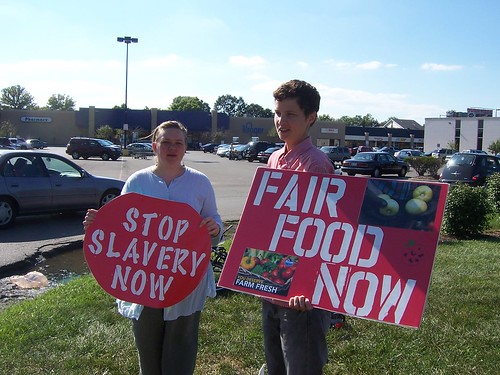Wendy Ake is helping w/ the campaign of the Coalition of Immokalee Workers to get Kroger to pay 1 cent more per lb of produce
- Artist: Wendy Ake
- Title: Coalition of Immokalee Workrer
- Length: 7:26 minutes (6.82 MB)
- Format: MP3 Stereo 44kHz 128Kbps (CBR)

Wendy Ake (left) and Deb Steele outside the Kroger near the corner of Olentangy River and Ackerman Roads
Ake works with the recently formed Central Ohio Immigrant Justice (COIJ)
She expects more groups will get involved in the demos in front of various Kroger stores in Columbus.
"The Kroger headquarters is located in Westerville. So Columbus is probably going to be more and more of an active hub for this movement."
Ake said demos are planned for Kroger stores in urban areas as well as suburbs.
Increasingly, people in wealthy nations such as the US are interested in local and organic food. But she said labor and human rights issues often are not prominent in those movements.
"People are mainly engaged with health issues and maybe chemical inputs into their food but not so much with the labor and human rights issues involved with their food."
"Early on when the food movement started contemporaneous w/ the environmental movement back in the 70s, all of these issues were looked at. But when the FDA began to articulate its standards for the organic movement, it looked specifically at the chemical inputs ...and so the human rights issues and standards began to be marginalized."
She and other activists are working on changing that. She agreed people's hearts and minds can be engaged by way of their palates and stomachs, connecting a wide variety of social justice and environmental causes for a mass movement to defeat corporatism. She said human rights and environmentalism are inseparable.
"When we have global warming, for instance, the people most impacted are the most marginalized populations, globally and in our own backyards."
She agreed that what is has happened to US farmers and US factory workers connects with what has happened to people in other parts of the world.
"The boundary that sometimes gets drawn between what's a domestic or local issue and what's a global issue is really fictitious. So, for instance, what sometimes gets described as a local 'immigration problem' is not really a local problem or a domestic problem...It's a global migration problem, rooted in international, structural issues like trade relationships that are set by the IMF and the WTO."
- Login to post comments
- Download audio file
